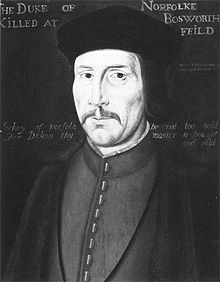John Howard, 1st Duke of Norfolk
| John Howard, 1st Duke of Norfolk | |
|---|---|
 |
|
| Spouse(s) | Katherine Moleyns Margaret Chedworth |
|
Issue
Thomas Howard, 2nd Duke of Norfolk
Nicholas Howard Isabel Howard Anne Howard Margaret Howard Jane Howard Katherine Howard |
|
| Noble family | Howard |
| Father | Sir Robert Howard |
| Mother | Margaret Mowbray |
| Born | c.1425 |
| Died | 22 August 1485 |
John Howard, 1st Duke of Norfolk KG (c. 1425 – 22 August 1485), was an English nobleman and soldier, and the first Howard Duke of Norfolk. He was a close friend and loyal supporter of King Richard III, with whom he was slain at the Battle of Bosworth in 1485.
John Howard, born about 1425, was the son of Sir Robert Howard of Tendring (1398–1436) and Margaret de Mowbray (1391–1459), eldest daughter of Thomas de Mowbray, 1st Duke of Norfolk (of the first creation) (1366–1399), by Elizabeth FitzAlan (1366–1425). His paternal grandparents were Sir John Howard of Wiggenhall, Norfolk, and Alice Tendring, daughter of Sir William Tendring.
Howard was a descendant of English royalty through both sides of his family. On his father's side, Howard was descended from Richard, 1st Earl of Cornwall, the second son of King John, who had an illegitimate son, named Richard (d.1296), whose daughter, Joan of Cornwall, married Sir John Howard (d. shortly before 23 July 1331). On his mother's side, Howard was descended from Thomas of Brotherton, 1st Earl of Norfolk, the elder son of Edward I of England by his second wife, Margaret of France, and from Edward I's younger brother, Edmund Crouchback.
Howard succeeded his father in 1436. In his youth he was in the household of John Mowbray, Duke of Norfolk (d. 1461), and was drawn into Norfolk's conflicts with William de la Pole, Duke of Suffolk. In 1453 he was involved in a lawsuit with Suffolk's wife, Alice Chaucer. He had been elected to Parliament in 1449 and during the 1450s he held several local offices. According to Crawford, he was at one point during this period described as 'wode as a wilde bullok'. He is said to have been with Lord Lisle in his expedition to Guyenne in 1452, which ended in defeat at Castillon on 17 July 1453. He received an official commission from the King on 10 December 1455 and also had been utilised by Henry to promote friendship between Lord Moleyns (his father-in-law) and one John Clopton.
...
Wikipedia
